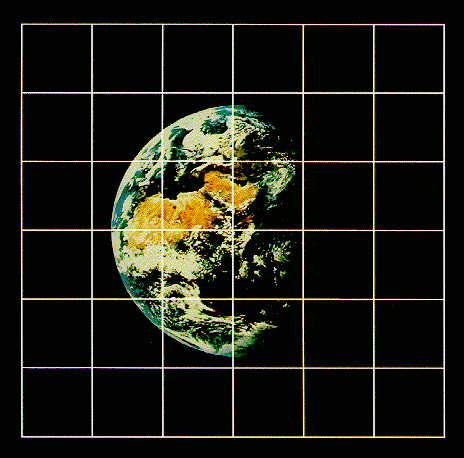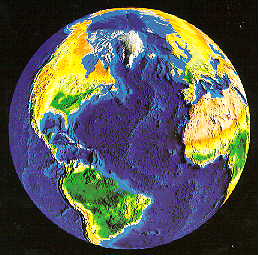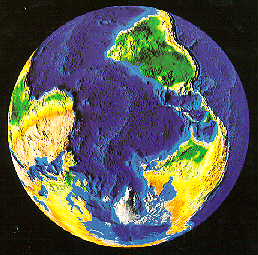 The Climatic Challenge
The Climatic Challenge 
| THE INTEGRITY PAPERS | Genre - Benking - US Website | ceptualinstitute.com |
 The Climatic Challenge
The Climatic Challenge 
Boutros Boutros Ghali has just announced (1998) the focus of the follow up processes after the most recent Earth Summit. We would like to inform readers about an event which took place in 1995 which actually prefaced this follow-up, concerned about what happens to agendas and summits after they are over. The issues range from a systemic display of the AGENDA 21, to looking into the common issues of events, gatherings or conferences. We will first document the International Corner -- the dialog process of the Round Tables (also see: "Sharing Voices and Views" ,and, "Voicetext" ) going on there -- and alter focus on how to bridge and link issues and agendas by designing coherent pictures of issues and addressing them through those models. We thank one of the exhibitors at the UN Climate Summit, the "UIA - Union of International Associations", in Brussels for materials, support, and the presence of Yehzkel Dror at the Climate Summit and at the International Corner, presenting his new book: "The Capacity to Govern" and a synopsis of the "6 Theses" as developed at the International Corner. {LINK**}
The International Corner and the Global Change Exhibition were invited {LINK***}to the Climate Summit to bring attention to unifying visions and approaches to dealing with the current global dilemma. (It is necessary in Berlin to access it under the title "Challenges to Science, Technology, Politics, and foremost Humanity" the agenda of humanity.)
This Earth or another Earth in trouble ?


The Problems:
- ∑ Orientation - missing values, perspectives, proportions and consequences
- ∑ Poor metaphors - focussing on just one monocultural framework
- ∑ Misguided perspectives - the perspectives that do exist are not based on
global knowledge, but on group centered and local experiences- ∑ Regions and Nations caught in stalemate misinterpreting the reasons for other
groups' opinions blocks at a very basic level any chance of forward movement
Poetic Reminiscence: The Worlds:
The planet Earth was once a place of remarkable beauty. Early explorers returned home full of awe at the variety with which nature had graced the various continents and achieved ecological balance in so many ways. But explorers were followed by settlers who tried to enforce their habits on the new areas while exporting away vast quantities of anything novel they found back to their home countries.
In time, people succeeded in destroying natural systems to such an extent that these systems were no longer able to function in the stable way that humankind needed for common and secure futures. Gradually the worries expressed by those who could see the dangers filtered through to all levels of society and governments were forced to take notice of this. Early attempts to come together globally to solve the problems showed, however, that current perceptions and structures for meetings made it almost impossible to even exchange ideas let alone agree on courses of action. A growing number of people realized that humans would have to solve the problems of communication and blinked thinking and learn to accept other talkers and listeners as equals, before the problems of world balance and sustainability could be addressed. Here are some of their thoughts on the matter.
Options presented or proposed:
- Create new and unfamiliar circumstances within a controlled environment such as a meeting. Many more patterns of thought, behavior and cycles exist than people usually think. Introducing the concept of total time allocation per person in meetings has the effect that participants quickly recognize the need to treat speaking time as a valuable commodity. More complicated models involve the possibility of penalizing or rewarding participants. This can be done by withdrawing speaking time or allotting extra time credits according to the vote of participants and audience.
- Make people more aware of vicious problem circles in society and the need to view systems as a whole before arguing for changes in individual areas. Many stalemates in discussions arise from the problem that one side simply doesn't see the connections between two processes that the other see as linked in a specific way.
- Establish participants' goals and visions for the future as well as their view of the current situation. Meetings have titles and agendas but participants often only vaguely know what others attending the meeting hope to achieve and why.
- Find new ways of getting the message across: Metaphors, symbols, mind-scapes, or other mental models speak a thousand words. At a global level, however, common ground is often lacking. Great care is therefore needed to find models that mean the same thing to everyone.
- Invest into Quality Control for Communication, Knowledge Organization, Knowledge Maps, Filter, Broker, and Navigation Facilities keeping in mind potential conceptual structures for orientation and support of awareness.
- Find new approaches and ways to achieve communication and understanding of both viewpoints and ideas, invest in viewpoint generation and transportation aids.
- Study inter-sectoral strategic dilemmas in development.
- Focus on multi-factor integrated modeling and Issue-Based Wicked Problem mapping (IBIS) and options and solutions clustering.
- Education offensive to support communication of additional abstract realities in mind- scapes, with spaces assigned for land/themescapes, context scapes, and word/literature-scapes.
The concept of adding viewpoints and changing positions was presented at EMEC:S '94 in Baltimore for enclosed coastal seas and is now applied to the planetary scale. We are grateful to the ‘Maryland Institute of Mediation’ for title Video "The Challenge of the Madrigal Sea - A Coastal Sea in Trouble".
Come any time during Climate '95 and share what we can do. International Corner Participants are:
- Club of Rome, Paris, France
- Commission On Global Governance, Geneva, Switzerland
- European Union, ENRICH Programme, Brussels, Belgium
- EEA European Environmental Agency, Copenhagen, Denmark
- GEO - AEON International Association for Experimental and Applied Ecology, Berlin, Germany
- HDP Human Dimension Programme, Geneva, Switzerland; local support by IGBP Office, Berlin, Germany
- ICSU International Council of Scientific Unions, Paris, Switzerland; local support by IGBP Office, Berlin, Germany
- IGBP International Geosphere-Biosphere Programme, Berlin
- IASA International Institute for Applied Systems Analysis, Laxenburg, Austria
- ISKO International Society for Knowledge Organization, Frankfurt, Germany
- SEF Development and Peace Foundation, Bonn, Germany
- UIA Union of International Associations, Brussels, Belgium
- UNEP United Nations Environmental Programme, Nairobi, Kenya
- WBGU Wissenschaftlicher Beirat der Bundesregierung zur Globalen Umweltveršnderung, Bremerhaven, Germany
- WCC World Council of Churches, Geneva, Switzerland
- WCRP World Climate Research Programme, Geneva, Switzerland
- WFM World Federalist Movement - Germany, Hamburg, Germany
- WFSF World Futures Studies Federation, Turku, Finland
- WHO World Health Organization - Collaboration Center for Global Modeling of Health Perspectives; local co-ordination: FAW, Ulm, Germany
- THE WORLD BANK, Washington, U S A
- WMO World Meteorological Organization, Geneva, Switzerland; local organization c/o IGBP office in Berlin, Germany
 The
Climatic Challenge
The
Climatic Challenge 
Links
Photo & Links (European Net-Homesite)